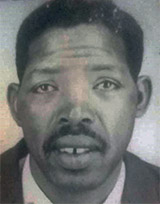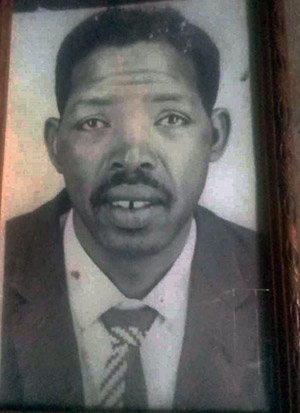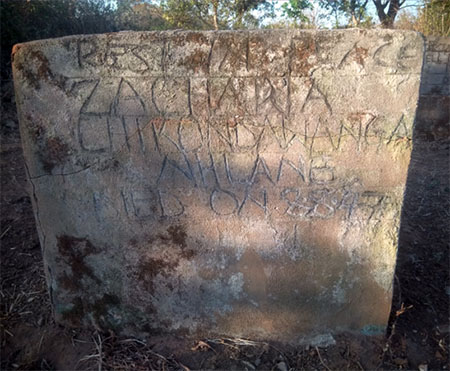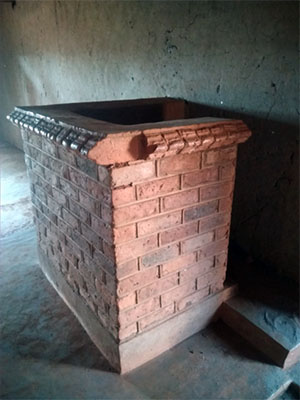Nhlane, Zachariah Chikondawanga

Zachariah Chikondawanga Nhlane was an evangelist and church leader who played a major role in establishing the work of Livingstonia Mission among the Ngoni of Mzimba during the first half of the twentieth century. He was born in 1871 into the Ngoni royal family. His father was Mayaye Nhlane, better known as Chiputula, and his mother was Impangeli Lomagazi Jere, a daughter of Inkosi ya Makhosi (Paramount Chief) M’mbelwa I. Their home was on the site known today as Chiputula Township in the city of Mzuzu. His father was a Sub Traditional Authority (STA) under Paramount Chief M’mbelwa I. [1] Together with Ng’onomo Makamo, Chiputula was also commander-in-chief of the Ngoni army, under Chief M’mbelwa. Chikondawanga had three brothers: Daniel, Yobe, and Beni, and one sister, Mndhlalose. [2]
As a young child, Chikondawanga went to stay with his aunt who was married to Moffatt Chirwa at Chintheche in Nkhatabay district. He was present there in 1881 when the Livingstonia Mission transferred its headquarters from Cape Maclear at the southern tip of Lake Malawi to Bandawe on its western shore. Living among the lakeshore Tonga people he became fond of fishing. One day Dr. Robert Laws, the leader of Livingstonia Mission, was walking along the lakeshore and found Chikondawanga and his friends fishing. After giving them some good fishhooks and rods, he asked them if they were willing to attend school classes, promising that they would then receive more fishhooks and rods. The whole group responded positively to this request. [3]
Chikondawanga thus started school at the age of ten in 1881. He was already tall, perhaps explaining why he was chosen as a class prefect. This pleased him very much so that he never missed school, though initially he did not excel academically. By the end of 1884, after he completed Standard 4, he decided to return to his own family. By this time his father had died, and the entire family had moved from Kaning’ina to Njuyu. [4] Though at this stage the Livingstonia Mission was not allowed to open schools among the Ngoni, William Koyi, a Xhosa evangelist on the Mission staff, was secretly teaching part-time classes at his home. Among the students were Chitezi Tembo, Makala Tembo, Mawelera Tembo, Daniel Nhlane, Beni Nhlane, Yobe Nhlane and Jonah Mwanza. The beginning of Christianity among the Ngoni can be traced to these secret classes.
In 1885 Koyi requested that the new boy Chikondawanga join the classes, and he responded positively, though the language was challenging for him. At Bandawe classes were conducted in Tonga and English, whereas Koyi taught mostly in Ngoni and partly English. Chikondawanga attended classes for two years, taking Standard 5 and 6 in 1885-1886. Koyi noticed that Chikondawanga was a fast learner who was able to speak and write very well in English. Soon he was appointed to teach Sunday School at Njuyu Mission. [5]
Chikondawanga married four times, though he was never a polygamist. In 1892, he married his first wife Teresa Nyazumira Longwe, a Tonga from Nkhatabay, who died within a year. Two years later, in 1894, Chikondawanga married Mandhlase Jere, a Ngoni from Ephangweni village. Mandhlase had one son, Moses, before she died in 1907 at Hoho. Knowing Chikondawanga’s good behaviour, hard work, and educational level, the Jere family offered Mandhlase’s thirteen-year-old sister Leah as chiuska nyumba / mbiligha (a continuation of marriage). After three years, in 1910, Chikondawanga married her. [6]
Leah bore him four children: Skangano, also known as Widson; Mightwell, Costas, and Tywel, also known as Msakaike. In 1921, Leah died soon after she delivered her last-born son. In view of the need for a wife and mother to look after a newly born baby, Chikondawanga married Annie Phiri, a daughter to his servant, T. A. Mzikubola Jere, who was from Chiwole Zgambo village. [7] Annie bore him another seven children: Langford, Washington, Letiyani, Wyson, Harlington, Medani, and Unes. [8] In 1928, two of his children with Leah, Skangano and Tywel, were killed by a leopard. [9] Despite the experience of loss and sorrow in his family life, Chikondawanga remained constant in his faith and witness.
He was baptized in 1890 at Njuyu. When Scottish missionaries Donald and Agnes Fraser settled at nearby Hora, Chikondwanga joined them and became their confidante. [10] In 1902, with the help of Chikondawanga, the Frasers moved from Hora to Embangweni. While they settled in the new environment, Chikondawanga continued to be a Sunday School teacher at Hoho. He was also chosen as the first music director and developed his skills as a composer. One of his songs, Mundipulike mwe, Chiuta wane (“Hear me, Oh my God”), is No. 287 in the Livingstonia hymnbook. [11] In view of his commitment to the work of the church, whenever Fraser returned to Hoho he used Chikondawanga as his “chola boy” (a person carrying a bag), a symbol that he was regarded as the local church leader. [12] In 1904 Chikondawanga was put in charge of the construction of a church at Hoho, and by 1910 the building was completed. [13] In 1914 Chikondawanga and Jonah Mwanza went to Embangweni to collect specially designed bricks for building a pulpit in the new church, which is still in use today. From 1904 to 1920 the only two people who preached in the Hoho church were Chikondawanga and Mwanza. Chikondawanga demonstrated his linguistic ability when he would preach in Ngoni and offer an immediate translation into Tumbuka. [14]
In 1921, Chikondawanga was elected as Muneni (local evangelist) as well as assistant teacher. In 1926 he became a full-time teacher at Hoho mission school while in the afternoons he continued with his usual job as a local evangelist. When Rev Charles Chidongo Chinula, one of the first African ministers in Livingstonia Mission, was assigned to Hoho as a parish minister in 1929, Chikondawanga became his first session clerk. The following year, when Chinula was suspended from the ministry, the Presbytery appointed Chikondawanga and Rev Andrew Mkochi to exercise spiritual care over Chinula during his suspension. [15] He continued his service as an evangelist until, early in the morning of August 7, 1947, Chikondawanga was suddenly found dead without having shown any signs of illness. He was buried on August 8, 1947, inside the cattle kraal at Hoho.
Over the course of his life, Chikondawanga made a major contribution to the reception of Christianity among the Ngoni of Mzimba. He was the founder of Hoho mission station in 1903, serving there both as a schoolteacher and a Sunday School teacher, and was in charge of the construction of the church for six years. He served as a session clerk for Rev. Charles Chidongo Chinula for a year-and-a-half. He was a song composer in both Tumbuka and Ngoni. Together with Chief Mzukuzuku, he convinced Donald and Agnes Fraser to go to Embangweni and establish the mission station there. Alongside Rev. Andrew Mkochi, he served as an adviser to Charles Chidongo Chinula after his suspension. He served as an evangelist for 26 years from 1921 until his death in 1947.
Emmanuel Doctor Kumwenda
Notes:
- Langford Nhlane, interview by author, February 21, 2024, Hoho, Mzimba.
- Ibid, March 3, 2024, Hoho, Mzimba.
- Owen B.M. Chirwa, interview by author, March 11, 2024, Nkhatabay.
- Medani Nhlane, interview by author, April 10, 2024, Jenda, Mzimba.
- Wyson Nhlane, interview by author, April 16, 2024, Hoho, Mzimba.
- Witness Zimba, interview by author, May 14, 2024, Hoho, Mzimba.
- Letiyani Nhlane, interview by author, May 26, 2024, Mzuzu.
- Medani Nhlane, interview by author, June 11, 2024, Jenda, Mzimba.
- Langford Nhlane, interview by author, June 19, 2024, Hoho, Mzimba.
- Samu Mzukuzuku Jere, interview by author, July 10, 2024, Loudon, Mzimba.
- Augustine Chingwala Musopole, Singing and Dancing for God: A Theological reflection on Indigenous Hymns in Sumu za Ukhristu, Mzuzu: Luviri Press, 2022, 278.
- Flyson Chirwa, interview by author, August 18, 2024, Hoho, Mzimba.
- Witness Zimba, interview by author, September 11, 2024, Hoho, Mzimba.
- Elitek Mwanza, interview by author, September 21, 2024, Chatoloma, Kasungu.
- Desmond Dudwa Phiri, Malawians to Remember: Charles Chidongo Chinula, Lilongwe: Longman Limited, 1975, 18.
Bibliography
Chirwa, Owen B.M. Interview by author, March 11, 2024, Nkhatabay. Chirwa, Flyson. Interview by author, August 18, 2024, Hoho, Mzimba. Jere, Samu Mzukuzuku, Interview by author, July 10, 2024, Loudon, Mzimba. Musopole, Augustine Chingwala. Singing and Dancing for God: A Theological reflection on Indigenous Hymns in Sumu za Ukhristu. Mzuzu: Luviri Press, 2022. Mwanza, Elitek. Interview by author, September 21, 2024, Chatoloma, Kasungu. Nhlane, Langford. Interview by author, February 21, 2024, Hoho, Mzimba. Nhlane, Letiyani. Interview by author, May 26, 2024, Mzuzu. Nhlane, Medani. Interview by author, April 10, 2024, Jenda, Mzimba. Nhlane, Wyson. Interview by author, April 16, 2024, Hoho, Mzimba. Phiri, Desmond Dudwa., Malawians to Remember: Charles Chidongo Chinula. Lilongwe: Longman Limited, 1975. Zimba, Witness. Interview by author, May 14, 2024, Hoho, Mzimba.
This article, submitted in December 2024, was researched and written by Emmanuel Doctor Kumwenda, minister of Nkhamenya, congregation in the Church of Central Africa Presbyterian Livingstonia Synod, under the supervision of Professor Kenneth R. Ross, as one of the requirements of the Church History course on the MTh in Contextual Theology at Zomba Theological University.
Photo Gallery






